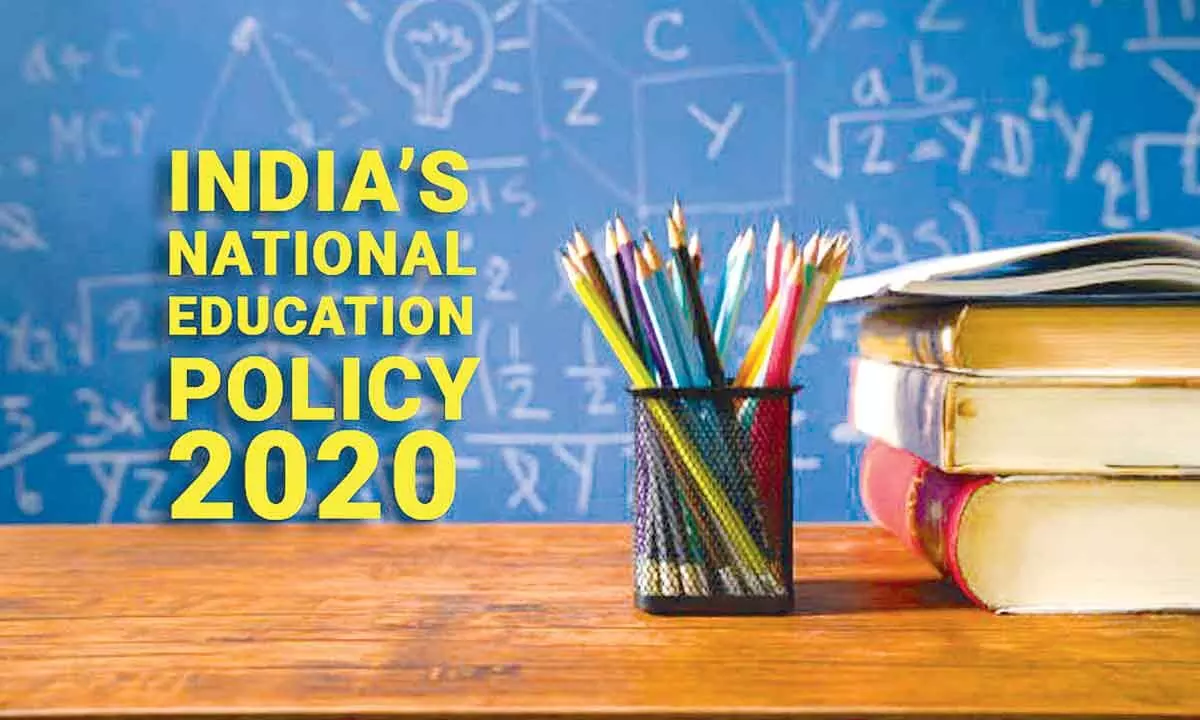An analysis of distinct features for effective implementation

There is a paradigm shift in the NEP wherein it is adequately focusing on mother tongue as medium of instruction up to class 5 and preferably till 8th class and beyond wherever it is possible for promoting national inclusiveness and Indian culture
The Union Cabinet approved the National Education Policy-2020 (NEP-2020) in July, 2020 after a gap of more than three decades since the implementation of the previous policy on education. It is, indeed, a blue-print on education for action to ensure 'Self Reliant India' envisaged as 'Aatma Nirbhar Bharat' as described by the Prime Minister, Narendra Modi.
Further, the NEP is a revolutionary policy in the sense that it is different in a number of ways from the earlier National Education Policy.
There is a paradigm shift in the NEP wherein it is adequately focusing on mother tongue as medium of instruction up to class 5thand preferably till 8th class and beyond wherever it is possible for promoting national inclusiveness and Indian culture.
There is a move in the NEP from knowledge-based education to knowledge and skill-based education. Concerted curricular and pedagogical initiatives, including the introduction of contemporary subjects, will be undertaken to develop the desired skill among the students at all levels.
There is also a change in NEP in the assessment of students in schools from memorisation method to the method of competency judgment.
Further, there is a shift in the NEP from 10+2+3 structure of education to 5+3+3+4 structure of education covering ages 3-18 with a new pedagogical and curricular restructuring accordingly.
There is another move in NEP from having curriculum contents in detail to having reduced curriculum contents in each subject to have space for supplementary contents rooted at regional levels to ensure more holistic based learning for students.
Yet another shift in the NEP is from being discipline specific to multi-discipline based education in HEIs in order to ensure the unity and integrity of all knowledge to make India a knowledge based society.
There is also a transformation in NEP from having a division of knowledge as arts, science and vocational education to have a holistic education and from having a division of curricular and extra-curricular activities to have holistic activities to restore the Indian long tradition of 'knowledge of the 64 kalaas' as was there in the ancient Indian Universities like 'Takshashila' and 'Nalanda'.
Moreover, there is a shift in the NEP from rigidity to flexibility at the entry and exit points in the system of education to give scope for continuation of education to increase Gross Enrolment Ratio and the structure and lengths of the degree programmes shall be adjusted accordingly. The NEP has envisaged that the undergraduate degree will be of either 3 or 4 years duration, with multiple exit options within this period, with appropriate certifications, i.e., a certificate after completing 1 year in a discipline, or a diploma after 2 years of study, or a Bachelor's degree after 3 years programme, or a degree with research after 4 years programme, if the students complete rigorous research project as specified by the HEIs.
Further, the HEIs have been allowed in the NEP to have 2years Master's programme with the second year devoted entirely to research for those who have completed the 3 years Bachelor's programme and to have 1year Master's programmefor students completing a 4years Bachelor's programme with Research and to have an integrated 5years Bachelor's/Master's programme.
The NEP further stipulates that students who have acquired a master degree or bachelor degree with research as a subject are eligible to pursue Ph.D programme. This is a remarkable move to promote research in the universities.
Further, the HEIs should have liaison with the Academic Bank of Credits, proposed in NEP so that the degrees from an HEI can be awarded by taking into account the credits earned in various HEIs.
There is a shift in the NEP from having a non-specific approach to having a specific approach on research and innovations by providing a scope for the establishment of National Research Foundation and creation of Start-up Incubation Centres, Technology Development Centres and Centres in Frontier Areas of Research.
There is a shift from having National Higher Education Institutions to having International higher Education Institutions by encouraging high performing Indian Universities to operate in foreign countries and facilitating such foreign universities to establish campuses in India so as to ensure internationalization of higher education to promote India as a global study destination.
There is a move in the NEP from limited use of technology to equitable use of technology by the establishment of National Educational Technology Forum so as to transform India into a more digitally empowered society to ensure 'Digital India' and to strengthen online and digital education to meet the current and future challenges in providing quality education to all. Further, there is a provision for HEIs to make use of digital technology platforms such as DIKSHA, SWAYAM, MOOCs etc, for imparting online education.
Last but not the least there is a shift in the NEP from not having a uniform and comprehensive regulatory mechanism for HEIs, both public & private, to having such a sound mechanism. For the performance of Regulatory, Accreditation, Funding and Setting up of Academic Standards, the NEP has envisaged the establishment of the National Higher Education Regulatory Council, National Accreditation Council, Higher Education Grants Council and General Education Council under Higher Education Commission of India:
Finally, the stakeholders of all the education institutions in India, being the true citizens of the country, should realize the importance of NEP, recognise their responsibility towards the nation, grasp the features of the NEP and implement it in its true spirit and letter to restore the role of Mother India as a Vishwa Guru.
(The author is the Professor in Public Administration, Former Pro Vice-Chancellor, Former Officiating Vice-Chancellor, Maulana Azad National Urdu University, Hyderabad, TSand Former Vice-Chancellor,
Sri Krishnadevaraya University, Ananthapuramu AP)










